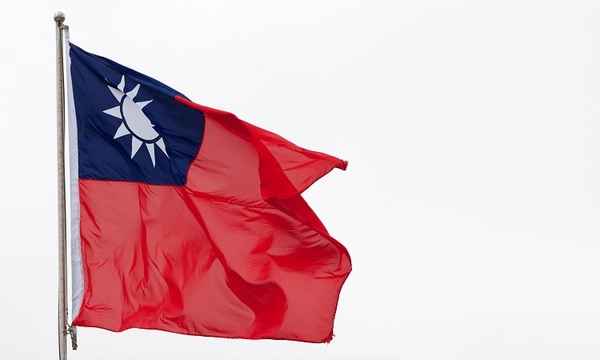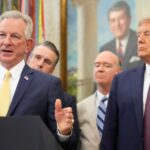
–>
June 1, 2022
There is a debate about whether to end the U.S. policy of “strategic ambiguity” toward the island of Taiwan and replace it with strategic clarity. President Biden in recent remarks has stated that the United States will militarily defend Taiwan in the event of a Chinese attack or invasion. Administration officials have had to “walk back” the president’s comments, stating that U.S. policy has not changed from “strategic ambiguity.” The Biden administration’s approach to this issue is, unfortunately, clouded in confusion.
‘); googletag.cmd.push(function () { googletag.display(‘div-gpt-ad-1609268089992-0’); }); }
That has not always been the case, however. America’s leading statesmen and strategists have repeatedly noted the strategic importance of Taiwan since the Nationalist government of Chiang Kai-shek fled to the island in 1949, when the communists took over the mainland.
On June 25, 1950, when North Korean forces invaded South Korea, George Kennan was summoned by Secretary of State Dean Acheson to discuss what America’s response should be to the communist aggression. In his diary, Kennan recalled that when he was asked his views, he said “whatever else happened it would be impossible for us not to take prompt steps to assure that Formosa [Taiwan] did not fall to the communists since this, coming on top of the Korean attack, would be calamitous to our position in the Far East.” Kennan in July drafted a memo urging Acheson to “make sure that the Defense establishment was fully aware of the seriousness of the danger of a successful communist move against Formosa.” Kennan later told Britain’s ambassador to Canada that Formosa “must be regarded as part of the whole Far Eastern picture,” and that its abandonment would mean that “all of the Far East and the Western Pacific. Including possibly Japan, must be abandoned to communism.” In his memoirs, while Kennan expressed little confidence in Chiang’s government, he wrote that he favored sending the Seventh Fleet to protect the island, which Truman did — and that action prevented a planned Chinese invasion of the island.
Another American strategist who believed that the defense of Taiwan was important to U.S. security was General Douglas MacArthur. In a June 14, 1950, memorandum, MacArthur advised the Joint Chiefs of Staff as follows: (1) “The strategic interests of the United States will be in serious jeopardy if Formosa is allowed to be dominated by a power hostile to the United States”; (2) “[T]he western strategic frontier of the United States rests today on the littoral islands stretching from the Aleutians through the Philippine Archipelago, [and] [g]eographically and strategically Formosa is an integral part of this offshore position”; (3) “The geographical location of Formosa is such that in the hands of a power unfriendly to the United States it constitutes an enemy salient in the very center of that portion of our position now keyed to Japan, Okinawa, and the Philippines”; (4) “Formosa in the hands of the Communists can be compared to an unsinkable aircraft carrier and submarine tender”; and (5) “[T]he United States should initiate measures to prevent the domination of Formosa by a Communist power.” And in his famous address to Congress after being fired by President Truman, MacArthur referred to Taiwan as a vital hub in the “protective shield for all of the Americas and all the free lands of the Pacific Areas.”
‘); googletag.cmd.push(function () { googletag.display(‘div-gpt-ad-1609270365559-0’); }); }
The American geopolitical strategist James Burnham, writing in National Review in the 1950s, called Taiwan “a key link in [America’s] western frontier, which runs from the Aleutians down the Japanese islands, the Ryukyus… to the Philippines.” Taiwan, Burnham wrote,  commanded “China’s… vulnerable and all-important north-south communications, both by water and (through the use of airpower) by land.” China’s threats to Quemoy, Matsu, and Taiwan, he explained, threatened “the integrity of the West’s Pacific frontier; the allegiance of the overseas Chinese in the great Pacific ports; [and] the political attitude of allied and neutralist Asians.” During the second Taiwan Strait crisis in the late 1950s, Burnham recommended the use of tactical nuclear weapons to defend the island.
commanded “China’s… vulnerable and all-important north-south communications, both by water and (through the use of airpower) by land.” China’s threats to Quemoy, Matsu, and Taiwan, he explained, threatened “the integrity of the West’s Pacific frontier; the allegiance of the overseas Chinese in the great Pacific ports; [and] the political attitude of allied and neutralist Asians.” During the second Taiwan Strait crisis in the late 1950s, Burnham recommended the use of tactical nuclear weapons to defend the island.
President Dwight Eisenhower publicly threatened to use nuclear weapons to defend Taiwan during the two Straits crises in the 1950s. In January 1955, Eisenhower persuaded Congress to authorize him to use armed force to defend Taiwan against a Chinese attack. It was a very broad authorization to “employ the Armed Forces of the United States as he deems necessary for the specific purpose of securing and protecting Formosa…” In the second volume of his memoirs, Eisenhower wrote about the Taiwan Straits crises: “If the capture of the offshore islands should, in fact, lead to the loss of Formosa, the future security of Japan, the Philippines, Thailand, Vietnam, and even Okinawa would be placed in jeopardy and the United States vital interests would suffer severely.”
After President Jimmy Carter ended formal relations with Taiwan, Congress passed the Taiwan Relations Act, which pledged the United States to help Taiwan provide for its self-defense against a possible attack by China. And in 1996, President Bill Clinton responded to China’s firing missiles near and over Taiwan and conducting amphibious exercises near the island by deploying an aircraft carrier battle group to the Straits.
As recently as late 2020, national security analyst Loren Thompson, paraphrasing the great geopolitical theorist Halford Mackinder, called Taiwan the “geographical pivot of history in the Pacific age,” because it “anchors a chain of islands that U.S. strategists have identified as crucial to containing the rising military power of China.” Thompson concluded that “if Taiwan fell under the sway of Beijing, either peacefully or by force, the strategic balance in the Western Pacific would be irreparably changed,” and “nations in the region would see it as the end of U.S. military dominance in the region, and their interpretation would be correct.”
As China has grown in power economically and militarily, the importance of Taiwan has also increased. What is fundamentally at stake is control of what the great Dutch-American geopolitical thinker Nicholas Spykman called the “Asiatic Mediterranean,” which includes the Sea of Japan, the Yellow Sea, the East and South China Seas, the Gulf of Thailand, the Java Sea, and the Andaman Sea. Geographically, Taiwan remains the key link and central hub in the first island chain that serves to contain the PLA Navy. Economically, Taiwan’s dominance of the microchip industry makes it both an economic and strategic prize of incalculable value.
“Strategic ambiguity,” which was put in place by the Nixon administration to help secure China’s assistance in defeating the Soviet Union in the Cold War, has outlived its usefulness. The “confusion” of the Biden administration is no substitute and may lead to dangerous miscalculations by China and our allies in the region. It’s time for “strategic clarity” on Taiwan.
‘); googletag.cmd.push(function () { googletag.display(‘div-gpt-ad-1609268078422-0’); }); } if (publir_show_ads) { document.write(“
Image: Alan Wu
<!– if(page_width_onload <= 479) { document.write("
“); googletag.cmd.push(function() { googletag.display(‘div-gpt-ad-1345489840937-4’); }); } –> If you experience technical problems, please write to [email protected]
FOLLOW US ON
<!–
–>
<!– _qoptions={ qacct:”p-9bKF-NgTuSFM6″ }; ![]() –> <!—-> <!– var addthis_share = { email_template: “new_template” } –>
–> <!—-> <!– var addthis_share = { email_template: “new_template” } –>







